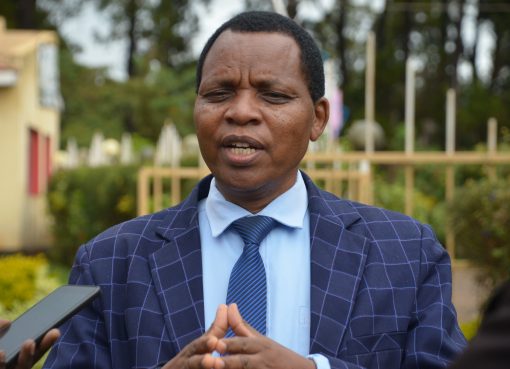A section of Baringo residents are opposed to the manner the government is dealing with cattle rustling in the country saying security operations have never been successful.
Speaking during Pilot pasture harvesting exercise in Chesirimion, Tiaty East Sub-County, Baringo County by Kenya Anti Cattle Rustling Programme, the residents said the security operations have been carried out since independence without success in the outcome.
Carlos Kapkoikat, a resident of Tiaty said forceful or punitive measures put up by the government have not worked in eradicating cattle rustling and it was high time for government to change tact.
“A development approach is the only way to eradicate cattle rustling menace in this country,” opinioned Kapkoikat.
Kurgat Ngetich, a representative of Baringo North in the Anti-Cattle Rustling Programme shared the same sentiments saying development such as the planting and providing of pasture to the pastoralists will silently end the menace.
Their sentiments were also shared by CEO of Kenya Anti Cattle Rustling Programme Dr. James Kendagor who said they believe that providing pasture and water to the pastoralists communities in Kenya will end conflict among them.
“We have been given mandate by the government through the Ministry of Interior and Coordination of National Government to supplement their efforts in eradicating cattle rustling and conflict among pastoralists in 33 counties,” he said.
“Cattle rustling has been around in the last 400 years and it was not a crime because it was a way of restocking among the pastoralists, it only became bad when commercial raid and harming started,” emphasized the CEO.
He added that it was worth to try an alternative mechanism to end the menace as envisaged by the programme he was leading.
The programme had received a grant of Sh1.9 million from the World Bank through Livestock Resilience Programme which they used to put 50 acres, being part of 7500 acres donated by the Loyamorok ward for planting of pasture.
“We are expecting to harvest about 600 bales of foxtail grass which will be distributed to the community free of charge,” said Dr. Kendagor.
He added that the next phase will involve fencing the 7500-acre parcel donated to the programme by the community before up scaling of pasture and other food crops.
The CEO strongly believes that the frequent killings, displacements, destruction of properties and stealing of livestock will be minimised if communities embrace a friendly type of land use and ownership that discourage movement of animals.
The programme is expecting to replicate the project in all the 33 counties with additional of water pans and boreholes to help in irrigating the pasture farms so as to have a year round of planting and harvesting.
Area member of County Assembly Mrs. Maria Losile praised the initiative saying it will help reduce the suffering the nomadic pastoralists go through in searching for pasture and water.
“We are going to support such initiatives as a community because it’s going to bring development to our people,” said Losile.
The leader said the programme is a proof that pasture cultivation can work in the area and that she was going to lead as an example to her people.
She urged the community to balance between culture and education so as not to lag behind in development but be at par with Kenyans.
Tiaty East Sub-County Commissioner Mr. Sylvester Manyasia thanked the programme for considering his jurisdiction for the project saying pasture and water were the root cause of conflict and once availed, the communities will coexist harmoniously.
“I know the fence they are putting up will also act as a deterrent measure as it will block the rustlers’ routes and this community will not allow them to pass through the pasture farms,” added the DCC.
By Christopher Kiprop



